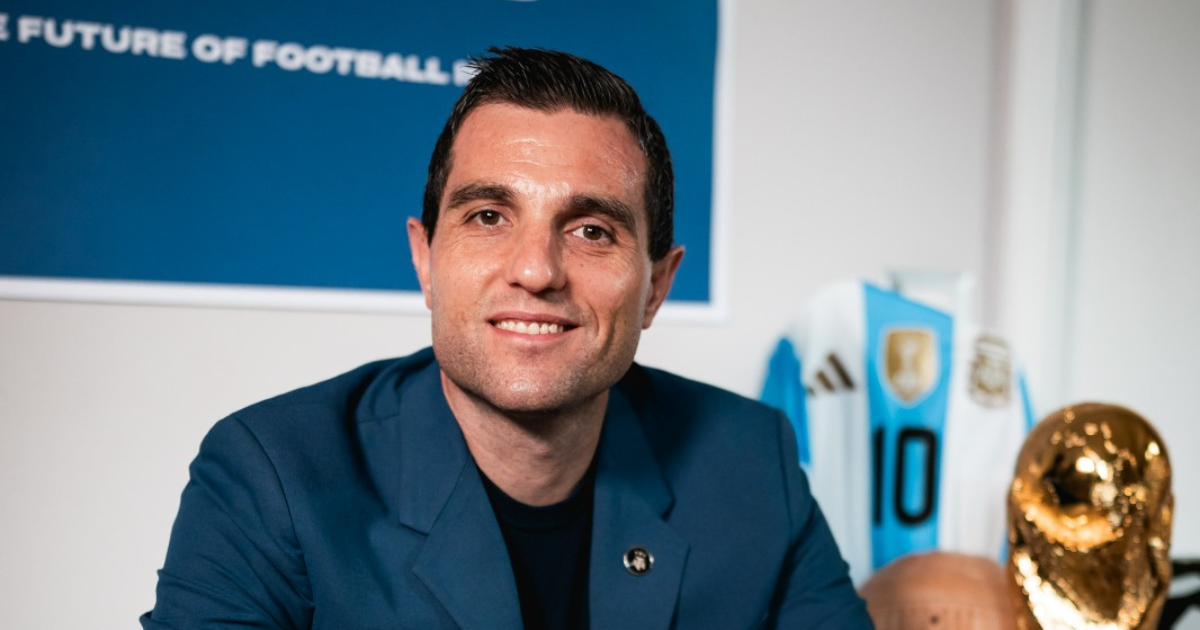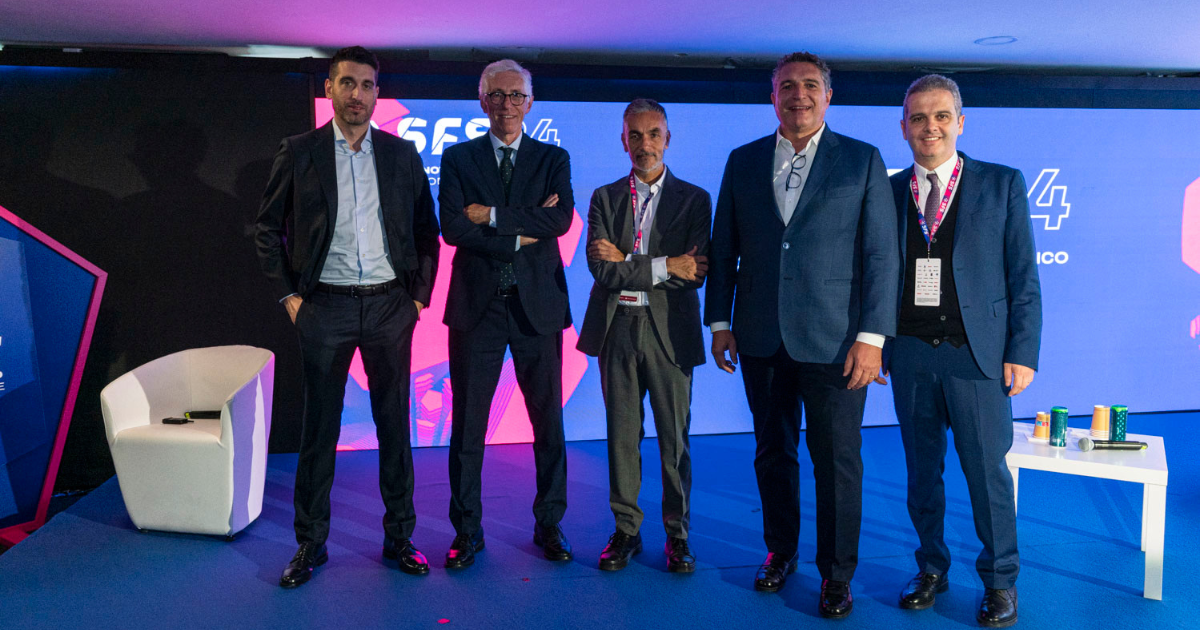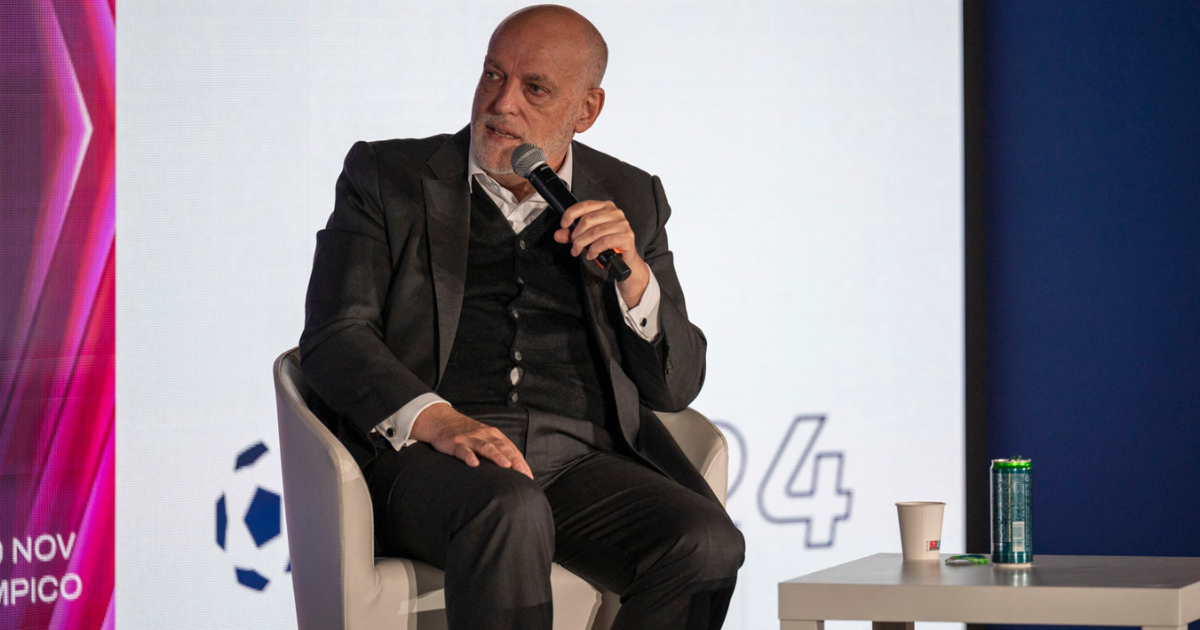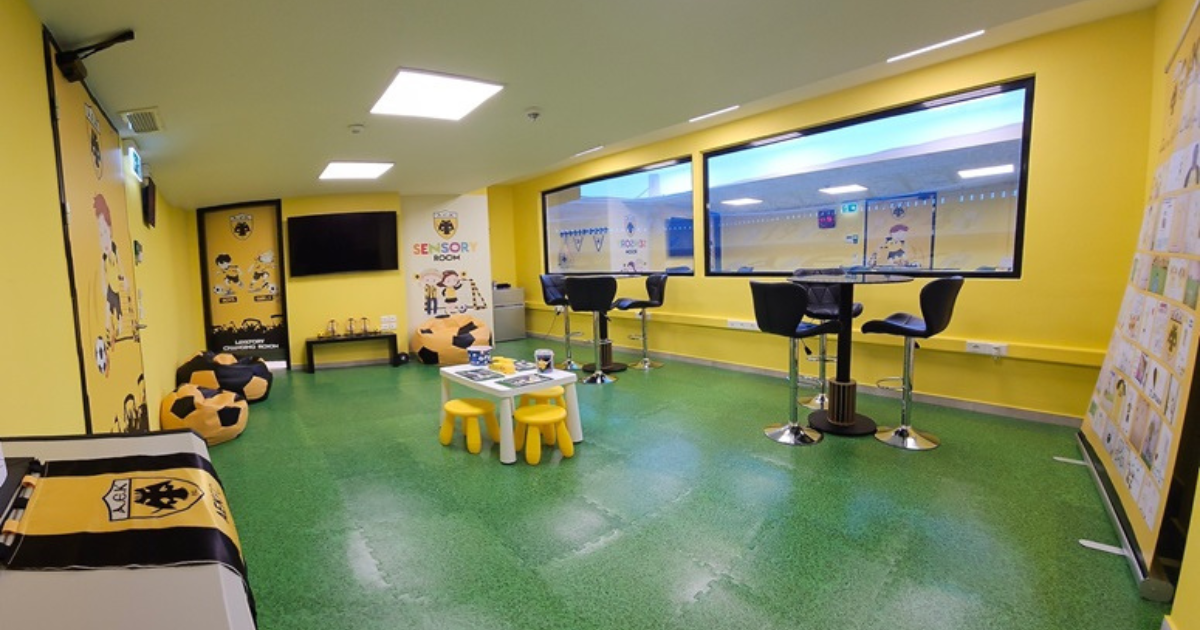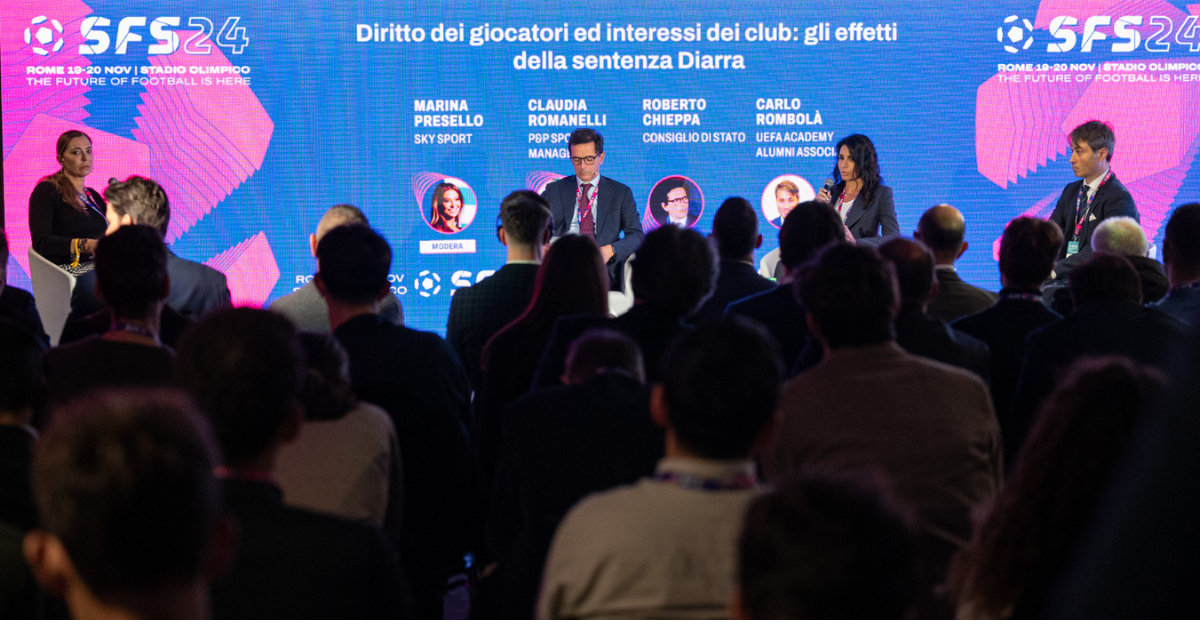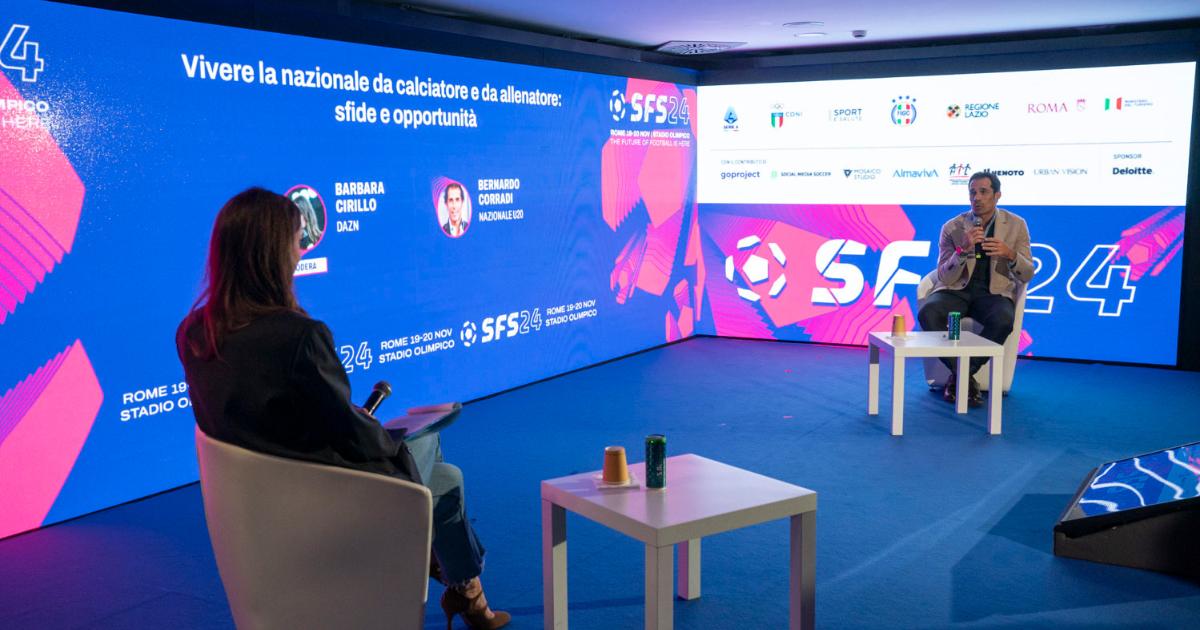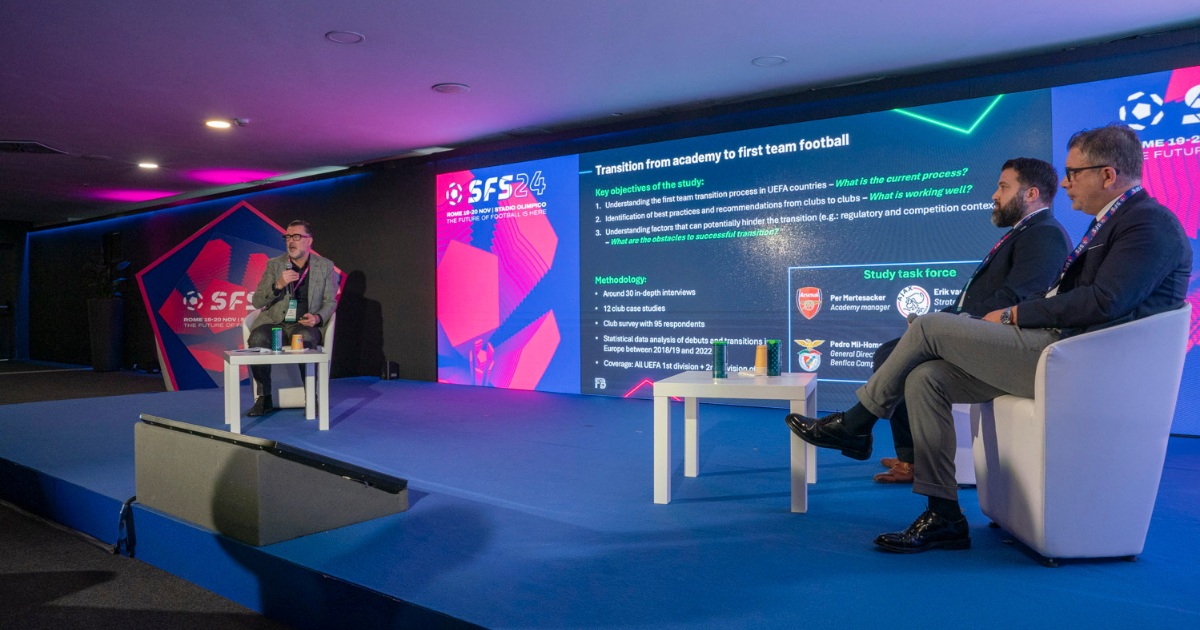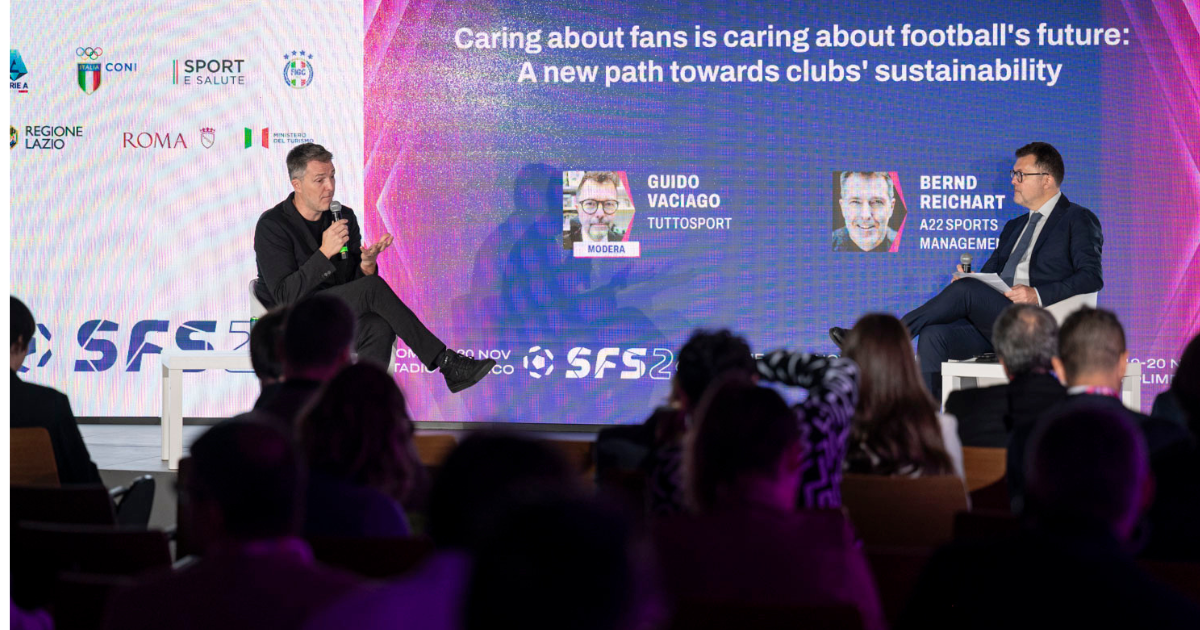Once again, SFS has established itself as an unmissable event for the football industry, attracting an ever-expanding B2B audience.
2024 has been a year of remarkable growth for the event, both in terms of participation and impact, cementing its position as one of the most authoritative platforms for networking and innovation in the sports industry. An incredible milestone, made possible by the 70+ partners who believed in this project!
The Stadio Olimpico in Rome welcomed over 4,000 attendees, including professionals, managers, and businesses, alongside 150 clubs, leagues, and federations, offering a program packed with insights, discussions, and business opportunities. The event featured around 150 national and international speakers, who shared their perspectives on the growth and future of one of the world’s largest industries. The main topics discussed included:
–Tech & Innovation: AI, metaverse, OTT, data analytics, and content production
–Business & Governance: investments, revenue models, growth strategies
–Fan Engagement & Media: new platforms, creator economy, digital engagement
–Sustainability & Social Responsibility: ESG, inclusion, and high-impact projects
–Health & Tourism: sporting events, wellness
A standout moment of the Summit was the SFS Awards, which honored 13 outstanding clubs, organizations, or individuals in the football industry, including Palermo FC for “Campaign of the Year” and Atlético Madrid for the Best Digital & Social Media team. The event also embraced emerging innovation, as SFS ExtraTime brought together over 200 startups competing to revolutionize the future of the football industry.
The Networking & Business area, with over 700 meetings, reaffirmed itself as the beating heart of the Summit, offering collaboration opportunities among clubs, investors, and tech companies. A one-of-a-kind networking experience, allowing stakeholders to mix moments of professional growth with more informal exchanges.
Another key highlight was the media and social coverage, which, in just two days, generated over 2.5 million views across major digital platforms and nearly 80,000 impressions.
SFS also reinforced its commitment to sustainability, achieving the EcoEvents certification (94% overall score) and reducing its environmental footprint through sustainable mobility initiatives and smart resource management. Additionally, the SFS Snack format further expanded the event’s international reach, with stages already held in Riyadh and scheduled for Brussels and other cities worldwide throughout 2025.
The 2024 edition of SFS closes with record-breaking figures – which you can check out here – and a growing impact on the global football industry. The success of the event reaffirms its role as a key platform for exchange and innovation, with eyes already set on the next edition. See you in 2025!
SFS24 REPORT: LET’S TALK NUMBERS!
Once again, SFS has established itself as an unmissable event for the football industry, attracting an ever-expanding B2B audience. 2024 has been a year of remarkable growth for the event, both in terms of participation and impact, cementing its position as one of the most authoritative platforms for networking and innovation in the sports industry. An incredible milestone, made possible by the 70+ partners who believed in this project! The Stadio Olimpico in Rome welcomed over 4,000 attendees, including professionals, managers, and
SFS INSIGHT: EXCLUSIVE INTERVIEW WITH LEANDRO PETERSEN
Leandro Petersen, Chief Marketing Officer of AFA (Selección Argentina de Fútbol), was one of the key figures at the SFS, where he shared his vision on the transformation of the Argentine Football Federation. In an exclusive interview recorded at the SFS studios, he delved into the pillars of AFA’s commercial growth, exploring how digital innovation, economic strategies, and global impact have reshaped Argentine football. Since joining the federation before the 2018 World Cup, Petersen has led a strategic transformation that has
Exclusive SFS24: the Serie A festival presented
During SFS24, Lorenzo Dallari (Editorial & Social Director of Lega Serie A) and Luigi De Siervo (CEO of Lega Serie A) presented the upcoming edition of the Serie A Festival, an event designed to bring Italy’s top football league closer to the general public. The festival offers a space for dialogue, discussion, and the celebration of football in all its facets. The event, created with the goal of showcasing Serie A in an innovative and accessible way, will take place from
Javier Tebas at SFS: the future of La Liga between financial fair play, piracy fight, and global growth
The president of LaLiga, interviewed by Sky Sport journalist Giorgia Cenni at SFS24, discussed economic sustainability, global expansion, and threats like online piracy, outlining the strategic vision for Spanish football. At SFS, Javier Tebas, the head of the Spanish league, provided a detailed overview of the challenges and opportunities facing Spanish football and, more broadly, the international football landscape. La Liga has long been a benchmark for sustainability and sporting success. Over the past ten years, Spanish teams have dominated on
AEK Athens FC: Football and Social Action for a Sustainable Future
Guided by its history and roots, AEK Athens FC has developed a social action plan that harnesses the unique power of football to raise awareness about major societal challenges and issues. With consistency and dedication, the Club organizes a range of initiatives designed to make a difference. AEK Athens FC has launched activities in several key areas: fighting racism and all forms of discrimination, promoting diversity, equality, and inclusion with full respect for human rights. Health and education, aiming to
SFS24: The Importance of Data in the Football Industry
The Changing World of Football Transfers Data Intervention, one of the most anticipated panels of the seventh edition of the SFS, offered an illuminating insight into the impact that artificial intelligence (AI) and data analysis are having on football, particularly in scouting and transfer processes. Some of the industry’s leading experts took the stage: Cenk Ergun, former Sporting Director of Galatasaray, Nicola Innocentin, CEO of Global Football Service, K. Tarkan Batgun, CEO of Comparisonator, and Steven Vanharen, Technical and Sporting Director
The Diarra Case and Sports Justice: Football Between Courts and International Regulations
Can a court judgement change the rules of the game?The panel “Players’ rights and club interests: the effects of the Diarra ruling” shed light on one of the most complex cases in modern sports justice, sparking new reflections on the balance between sports law and EU law. Moderated by Sky Sport journalist Marina Presello at SFS24, the panel featured Claudia Romanelli (P&P Sport Management), Roberto Chieppa (President of Section at Consiglio di Stato), and Carlo Rombolà (UEFA Academy Alumni Association). Lassana
“Playing for Italy is a privilege and a responsibility”, said Bernardo Corradi at SFS24
During SFS24, the event that annually brings together experts and key players in the football industry to discuss its evolution, Bernardo Corradi shared his experiences from past to present, retracing his journey from being a National Team player to coaching Italy’s U-20 side. Moderated by DAZN journalist Barbara Cirillo, the panel offered an insightful reflection on the modern role of a coach and the importance of communication and personal growth for young players. With 246 Serie A appearances, 56 goals, and
Youth Academies: The Foundation of Success in Modern Football
The Future of Football Lies in Youth Academies. This was the key takeaway from the panel "The Future of Football: Growth and Development of Youth Academies" at the SFS, where top experts discussed the transition from academies to the first team, delving into its challenges, opportunities, and best practices. Among the speakers were Pouya Yaghoubinia (Development Manager, ECA), Andrea Sartori (CEO & Founder, Football Benchmark), and Federico Cherubini (Senior Football Advisor and former Juventus executive). How is the success of a
SFS24: SUPERLEAGUE, SUSTAINABILITY, AND THE FUTURE OF FOOTBALL
The debate around the Superleague has never truly faded. Over the past three years, football has been at the center of a clash between opposing visions: on one side, the “football of the people”, and on the other, the “football of the rich”. But is it really so easy to draw a line between good and bad? Probably not, and this is one of the reasons why the future of football remains a divisive topic, with generations confronting each other




